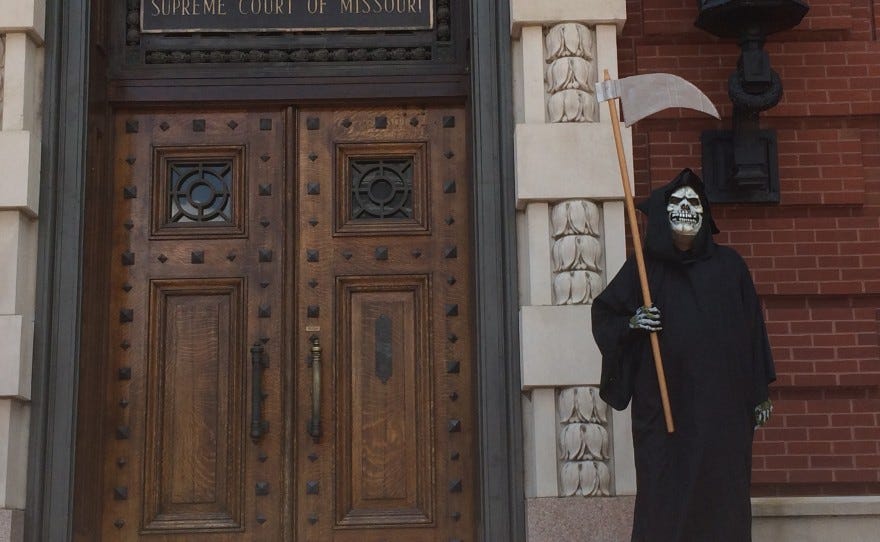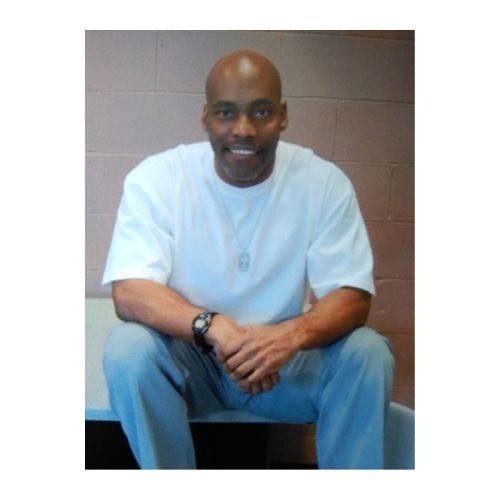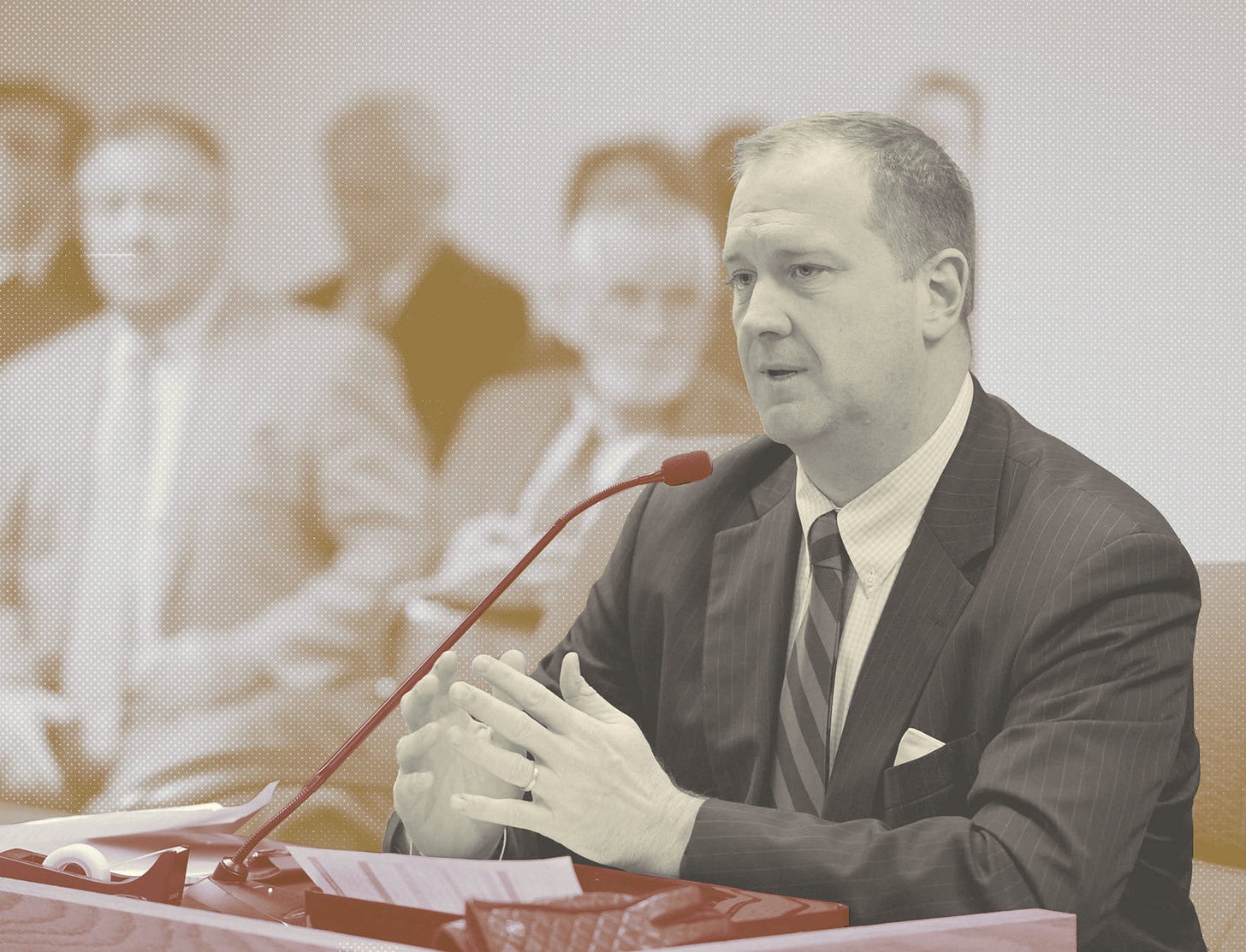The St. Louis Monthly Observer: Addressing the Grim Reaper in the Room
Missouri’s Attorney General has a literal bloodthirst; what does this mean for the new state law targeting wrongful convictions?
By Liz Ramsey1

Innocence.
In Missouri, it doesn’t amount to much, if we are to believe what the Missouri Attorney General has repeatedly argued. Rodney Lincoln, Lamar Johnson, Kevin Strickland, Joe Amrine, Brad Jennings, Mark Woodworth, Ricky Kidd, Ryan Ferguson: these men are only a small sampling of the individuals who our elected Attorney General has fought to keep behind bars in recent years, typically relying on procedural arguments, innocence be damned.
Their families be damned.
Their individual lives be damned.
Most exonerations - or the legal “clearing” of a person’s criminal conviction - do not involve a black-and-white vindication like DNA, like television would have you believe. And without something as straightforward as DNA evidence, the only way, currently, to exonerate someone who has been wrongfully convicted of a crime in Missouri is by going head-to-head with the Grim Reaper himself:
The Missouri Attorney General, currently wearing a human suit resembling former state senator Eric Schmitt.
The Grim Reaper’s explicit policy - unwavering over the last several decades - has been “defending every conviction to the last court.” He and his army of willing drones have even argued that an actually innocent man could be put to death, so long as he had a “fair trial.”2 A fair trial in the sense that he could not show he had been denied any constitutional rights during the trial itself, with no regard to truth or justice.
The Grim Reaper operates in predictable ways: fight, obstruct, and confuse judges and the public with absurdity, even to the point of making contradictory arguments. These themes dominate the office regardless of the political party holding it.
Take the case of Brad Jennings, a husband and father wrongfully convicted of murder for his wife’s death. The death was originally a ruled suicide by firearm by local authorities, based on evidence that included gunshot residue on her hand and a high blood alcohol content.
Brad was prosecuted by the Grim Reaper’s right-hand man, his Assistant Attorney General Kevin Zoellner, whose primary job is to prosecute death penalty cases in Missouri. Although Brad’s case wasn’t a death penalty case, the Reaper took his life another way, with Brad’s ultimate sentence of 25 years of incarceration away from his children. Children who had already lost a mother -- and now the Grim Reaper sought to steal away their father, too.
Nearly nine years after Brad was arrested and convicted of murder for his wife’s death, his lawyers discovered evidence of the concealed gunshot residue test that proved Brad’s innocence. They filed a “petition for habeas corpus” - the first step and final chance to free a person who has been wrongfully convicted. But Brad and his lawyers had to face the Grim Reaper again; the Missouri Attorney General’s Office handles all habeas petitions.
In 2016, the Grim Reaper took the human form of our nefarious U.S. Senator Josh Hawley. Their scythes raised, the Reaper and his drones insisted that Brad could not challenge his conviction, claiming he should have known about the hidden test result, while they simultaneously denied knowing about it. But Brad should have known, the Grim Reaper argued, and he should have questioned the prosecutors from his prison cell about a test he didn’t know existed.
These are the unreasonable, unattainable expectations that the Grim Reaper and his army of assistant attorneys general hold. Fortunately, in Brad’s case, justice prevailed and the Missouri Court of Appeals dealt its devastating response to quell the beast:
“The State’s admitted failure to ever, let alone timely, disclose this critical evidence renders particularly repugnant the State’s argument that [Jennings] should have earlier discovered the undisclosed [evidence].”3
After languishing nearly a decade in prison, Brad finally was released as a direct result of the discovery of that gunshot residue test. This is the drawn-out battle that must ensue to have even a hope of defeating the Reaper.

But wrongfully convicted men and women have begun to rise up to confront the Reaper in his hunt for souls, including a man named Lamar Johnson. Lamar was convicted by a St. Louis City jury of murder and sentenced to life in prison in 1995. Similar to Brad’s conviction, Lamar also was spared the death penalty.
Current St. Louis City Circuit Attorney, the local prosecutor, Kim Gardner established a “conviction integrity unit” through her office in an effort to evaluate questionable past convictions.
Gardner’s unit evaluated Lamar’s case and found extensive evidence of his innocence, including severe misconduct by assistant prosecutors and police, undisclosed payments by the prosecutor to the only eyewitness in the case, and credible confessions to the murder by two other men. 4
Gardner partnered with Lamar’s defense attorney and initiated the legal proceedings to release Lamar. Filing her own Motion for New Trial, instead of the standard Habeas Corpus Petition, Gardner attempted to bypass the Grim Reaper with a creative new approach.

But the Reaper will not be denied access to human souls.
A St. Louis City judge appointed the Grim Reaper to intervene in the case. Ready and willing to “fight each conviction to the last court,”, the Reaper argued Lamar’s innocence was inconsequential and he should remain incarcerated. Lamar, the Grim Reaper argued, hadn’t gone through his tunnel, and therefore did not deserve his freedom.
The Grim Reaper won when the Missouri Supreme Court ultimately agreed with his arguments. However, he did not walk away unscathed: Justice Stith wrote her own opinion and while she agreed with the result, she nevertheless reprimanded the Grim Reaper for his misplaced belief in defending “every conviction to the last court:”
“In suggesting it is his duty…to oppose a request for habeas or similar relief, the attorney general misunderstands the full extent of the prosecution’s role in the justice system.
The United States Supreme Court has explained that the prosecutor’s role is not simply one of being an adversary to the defense. To the contrary: a prosecutor's role transcends that of an adversary: he is the representative…of sovereignty…whose interest…in a criminal prosecution is not that it shall win a case but that justice shall be done.”5
The Missouri Supreme Court made clear that a locally elected prosecutor had no power under existing law to take any steps which would bring justice to a person who was wrongfully convicted, even in the face of undeniable evidence of innocence. The Court noted the mechanism available to a wrongfully convicted person is to battle the Grim Reaper head-to-head through a habeas corpus petition, an elusive remedy likened to “catching a unicorn.”
For a wrongfully convicted person who is not on death row to win a habeas corpus petition, they must show their constitutional rights were violated and therefore they did not receive a fair trial. Innocence, as the Reaper claims, is inconsequential to whether someone can escape his grip. Oftentimes, the successful path to freedom comes in the form of hidden evidence and backroom misconduct by prosecutors or police officers, which means that a wrongfully convicted person must know something that they don’t actually know.
Innocence is not enough.
Following the decision in Lamar’s case, the Missouri Legislature passed Senate Bill 53, which would authorize conviction integrity units such as those established in St. Louis and Kansas City. The Reaper’s grasp on the innocent in Missouri may be loosening, not by his own will.
Senate Bill 53 would allow a local prosecutor to file a motion to set aside the verdict against a wrongfully convicted person if they have information that the convicted person may be innocent or there was a constitutional error at trial that undermines confidence in the verdict. A wrongfully convicted person could now argue actual innocence, with or without alleging a constitutional violation, so long as they obtain the support of the prosecuting attorney’s office who convicted them. 6
There are two big catches to Senate Bill 53, as there always seems to be in Missouri. The Reaper will not be denied.
First, the Missouri Attorney General can argue against the local prosecutor’s motion to set aside the verdict after it has been filed and before the judge can make his decision; in exchange, the Grim Reaper cannot appeal if he loses.
Second, the motion can only be filed by the local prosecutor of the county where the individual originally was wrongfully convicted; the convicted person may not file the motion to set aside a verdict independently and without the local prosecutor.
Wrongful conviction cases like Lamar Johnson’s have been in the news lately as some prosecutors have openly admitted that a person in their office convicted an innocent person - one of Senate Bill 53’s key requirements. But in reality, these types of cases are the small minority of wrongful convictions; it is unbelievably rare to find prosecutors who would be willing to admit to such a mistake, such a travesty of injustice.
But prosecutors are supposed to be ministers of justice, with a duty to those they serve.
As such, we must find a solution in Missouri that allows anyone, independent of the Grim Reaper, to argue actual innocence in the same manner afforded to local prosecutors. Without providing that same pathway to the individuals who have been wrongfully convicted, our laws signal to the Grim Reaper that he still holds the ultimate power to collect innocent souls.
We must never forget that the system favors the Reaper hoarding souls, the individuals held captive because of an injustice, mistake, or worse.
We must deny him of all the lives he seeks to steal.
Liz Ramsey is a practicing attorney in St. Louis, Mo., with a focus on criminal defense and wrongful convictions. She works for the Law Office of Robert Brooks Ramsey LLC. She is @lizardsja on Twitter.
Laura Denvir Stith, A Contrast of State and Federal Court Authority to Grant Habeas Relief, 38 Val. U. L. Rev. 421 (2004). Available at: https://scholar.valpo.edu/vulr/vol38/iss2/6, "Are you suggesting, ... even if we find that Mr. Amrine is actually innocent, he should be executed?" The Assistant Attorney General answered: "That's correct, your honor."
State ex rel. Hawley v. Beger, 549 S.W.3d 507, 512 (Mo. Ct. App. 2018)
State v. Lamar Johnson SC98303 Justice Stith Concurring in Part and Result, P. 6, quoting United States v. Bagley 473 U.S. 667, 675 n.6 (1985) and Berger v. United States 295 U.S. 78, 88 (1935)



